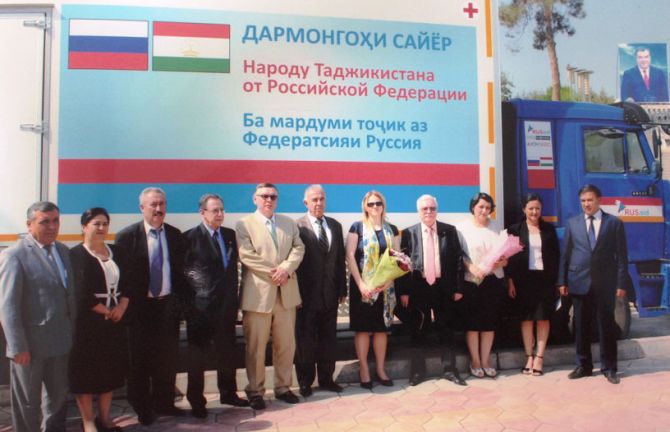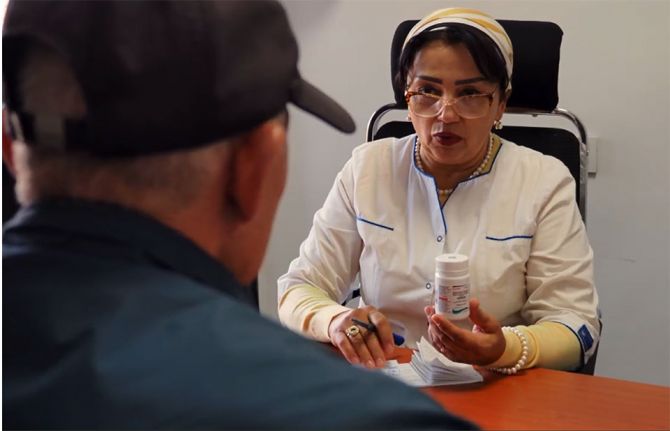

At the launch, a Russian-made mobile clinic and diagnostic centre was presented to the Government of the Khatlon Region.

Local citizens in the city of Kurgan-Tube during the public launch of the Technical Assistance Programme in Tajikistan.
Feature Story
Technical Assistance Programme for Countries of Eastern Europe and Central Asia in Combating Infectious Diseases launched in Tajikistan
12 September 2013
12 September 2013 12 September 2013The national launch of the Technical Assistance Programme for Countries of Eastern Europe and Central Asia in Combating Infectious Diseases took place in the Tajikistani city of Kurgan-Tube, in the Khatlon Region on 10 September 2013.
The Technical Assistance Programme, supported by a three-year grant of US$ 16.5 million from the Russian Government, aims to strengthen health systems, ensure better epidemiological surveillance of HIV, and promote the scale up of HIV prevention programmes among key populations at higher risk in Armenia, Kyrgyzstan, Tajikistan, and Uzbekistan.
The Programme is supported by the contribution of the Russian Government as a leading partner for health and development in countries of the Commonwealth of Independent States, and is being implemented by UNAIDS, in partnership with the non-governmental organization 'AIDS Infoshare'.
The launch was attended by representatives of the Russian Presidential Administration, the Russian Ministry of Foreign Affairs, the Ministry of Health of Tajikistan, the Government of the Khatlon Region, the City of Kurgan-Tube, the Ministry of Health of Armenia, as well as representatives from UNAIDS, 'AIDS Infoshare' and civil society organizations from Russia and Tajikistan.
The HIV epidemic in Tajikistan, affects mainly people who use drugs and now the number of new HIV infections is growing among people migrating abroad for work. Knowledge about HIV prevention remains limited among migrant workers and access to HIV services are not widely available upon their return as most live in rural and hard to reach regions of the country.
At the launch, a Russian-made mobile clinic and diagnostic centre was presented to the Government of the Khatlon Region. Equipped with the latest in medical equipment and diagnostic systems, the clinic will provide populations at higher risk of HIV infection in the Khatlon Region with access to integrated HIV testing, counselling and other forms of medical diagnostics and treatment.
Quotes
Through this programme Tajikistan will reach the communities most at risk of HIV infection and will break the trajectory of the epidemic.
The people of Tajikistan are very grateful for the timely, generous support of the Russian Government in this important programme.
This initiative is a new level of cooperation in the positive history of economic and cultural relations between the people of the Russian Federation and the people of the Republic of Tajikistan.
Russia considers this to be a model of donor aid effectiveness that will be promoted during Russia's Presidency of the G8.
Migration should never be a barrier to access quality health services or learn one's HIV status. This mobile clinic will bring the latest HIV information and medical technology to communities in Tajikistan that are most at risk of HIV infection.
Related
 Women, HIV, and war: a triple burden
Women, HIV, and war: a triple burden

12 September 2025
 Displacement and HIV: doubly vulnerable in Ukraine
Displacement and HIV: doubly vulnerable in Ukraine

11 August 2025

